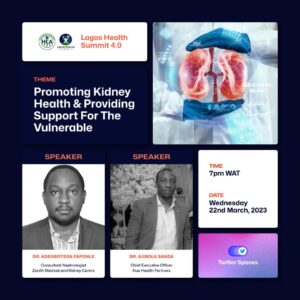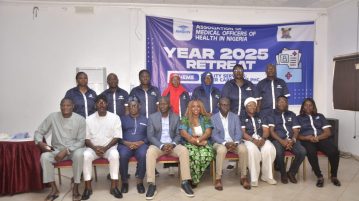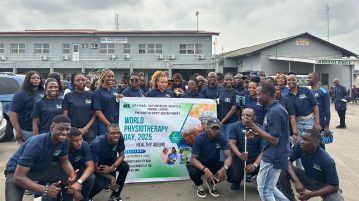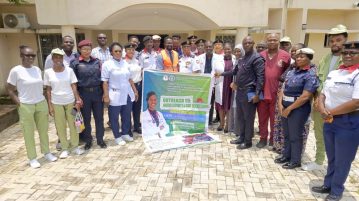Annually, The World Kidney Day (WKD) is celebrated on the 9th of March across the globe to raise awareness about chronic kidney disease (CKD).
This year, in commemoration of the WKD, Lagos Health Summit created another platform to increase awareness about kidney health with the goal of reducing the frequency of kidney disease, particularly among vulnerable populations. The platform which focused on discussing causes of kidney disease, how to prevent it, and how to reduce its prevalence, held virtually on the 22nd of March, 2023. Guest Speakers at the event were: Dr. Ajibola Sanda, a Nephrologist and CEO of Nue Healthcare Partners, and Dr. Adegboyega Faponle, a Consultant Nephrologist at Zenith Medical and Kidney Centre (ZMKC) – who has led a team of transplant professionals in Nigeria and overseen over 500 transplants at the facility.
CKD affects one in ten people worldwide and is an incurable disease that requires lifelong care. In Nigeria, CKD is a pandemic that affects people regardless of their age, gender, body size, income level, or education.
Dr. Sanda discussed how CKD has become widespread in Nigeria, citing an example from Lagos State University Teaching Hospital (LASUTH), where at least 25 patients are dialyzed daily, and sometimes there is not enough capacity to handle all of them. He explained that while diabetes is the leading cause of kidney disease globally, in Nigeria, chronic glomerular nephritis, diabetes, and hypertension are the leading causes. Other causes listed include HIV/AIDS, lupus, and sickle cell disease (SCD), which affects a significant proportion of Nigerians, as Nigeria has the highest number of SCD cases globally. Dr. Faponle added that a gene called APOLIPO-1 present in every black person, is also a cause of CKD. Highlighting that “when this gene is unmutated, it is protective against Trypanosoma infections, but when mutated, it puts people at a higher risk of CKD”. Other causes also mentioned include excessive use of painkillers and a genetic condition called Autosomal Dominant Polycystic Kidney Disease (ADPKD).
The discussion was steered then towards prevention strategies at the primary, secondary and tertiary levels, including advocacy and awareness campaigns on the causes and symptoms of CKD. Such as, foamy or frothy urine, early morning face puffiness, reduction in urine output, and swelling of the lower limbs. In which most of these symptoms occur at the advanced stage of this disease. The importance of water intake to prevent CKD and efficient health insurance to cater for CKD patients was also emphasized. During which Dr. Faponle suggested collaborations with telecommunication companies to create an insurance fund, by deducting a certain amount from airtime recharged, and these deductions should be based on people’s level of income to achieve equity in accessing quality healthcare. Dr. Sanda added that companies that contribute to CKD causes, such as tobacco and alcohol companies, should also be taxed in lieu.
Furthermore, the need for more public-private-partnerships to promote kidney health and other collaborations to subsidize the expensive cost of kidney care in Nigeria was reemphasized. Some of the cited means to achieve this are making primary healthcare available for prevention and early treatment among the low income and majority of the population and creating a renal registry by the Nigerian Association of Nephrology (NAN) for data collation to help attract foreign investment into the healthcare sector. Also, the dire need for avenues to inform the public about kidney disease services and facilities without violating advertising restrictions by the medical profession ethics was brought to the fore. This led the speakers to shed some light on past and present kidney health achievements in Nigeria.
Dr Sanda shared that Zenith Medical and Kidney Centre (ZMKC) has performed the highest number (over 1000) of kidney transplants in Nigeria with about 150 done in a year, while St. Nicholas was the first to conduct a kidney transplant in sub-Saharan Africa with about 10 done monthly. LASUTH also has completed eight transplants so far and is currently preparing for three more. According to Dr Faponle, other government tertiary hospitals too are able to handle these cases of kidney transplant, as the teaching hospital in Ife was the first to complete a kidney transplant in 1999. These fuels the belief that Nigeria has the necessary skills and resources to perform more transplants, which would save people from spending millions on seeking care abroad. However, bottle necks, bureaucracy and lack of will power – especially in the public health sector – hinder these activities.
Kidney care and transplant is very expensive but can be made cheaper and more readily available, if the bottle necks are addressed and private investors venture into providing or financing tertiary healthcare in Nigeria. This can help to reverse medical tourism and retain our best hands in the system as well. The government cannot do it alone…
Likewise, investment opportunities in renal care were revealed during this conversation. With the preamble that Nigeria is the largest black country in the world, some of the several promising investment areas highlighted include local production of post-transplant medication, renal biopsies, tunnel characterization, and therapy for patients with resistant hypertension, plasmapheresis, and molecular lab for donor match. Beyond these and other numerous areas for investment in the Nephrology specialty, it was mentioned that the ZMKC in Nigeria is the only certified facility in Africa offering interventional Nephrology.
In conclusion, the speakers advised participants and the general public that early control of kidney conditions can prevent the need for a transplant. And also called for an active involvement of Government in primary health care to slowdown and even eliminate the progression of CKD among the populations.
You can listen to the full discussion on Promoting Kidney Health by Health Care Analytics Consults (HCA Consults) here.

About Author:
Rasheedat Ameen is the Communication Lead/Editor at HCA Consults.
The Lagos Health Summit is organized annually by Health Care Analytics Consults (HCA Consults) and the fourth edition is scheduled to hold on the 26th of July, 2023 at the Muson event Centre, Lagos, Nigeria. This summit is set to engage notable companies and personnel with remarkable interventions and diverse innovations in the health sector. Interested participants can register to attend via this link.




